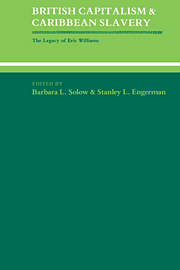Book contents
- Frontmatter
- Contents
- List of Contributors
- Preface
- British Capitalism and Caribbean Slavery: The Legacy of Eric Williams: An Introduction
- Part I Slavery as an Economic Phenomenon
- Part II Caribbean Slavery and the Industrial Revolution
- Part III The Decline of the British West Indies
- The American Revolution and the British West Indies' Economy
- “Dreadful Idlers” in the Cane Fields: The Slave Labor Pattern on a Jamaican Sugar Estate, 1762–1831
- Part IV The Basis of Abolition and Emancipation
- Part V Capitalism and Slavery in Historical Perspective
The American Revolution and the British West Indies' Economy
Published online by Cambridge University Press: 15 December 2009
- Frontmatter
- Contents
- List of Contributors
- Preface
- British Capitalism and Caribbean Slavery: The Legacy of Eric Williams: An Introduction
- Part I Slavery as an Economic Phenomenon
- Part II Caribbean Slavery and the Industrial Revolution
- Part III The Decline of the British West Indies
- The American Revolution and the British West Indies' Economy
- “Dreadful Idlers” in the Cane Fields: The Slave Labor Pattern on a Jamaican Sugar Estate, 1762–1831
- Part IV The Basis of Abolition and Emancipation
- Part V Capitalism and Slavery in Historical Perspective
Summary
The plantation system in the British West Indies cannot be viewed only in the light of the monocultural production of sugar by exploited black slave labor. It was also the social, political, economic, cultural, and psychological lifeline of British mercantilism. Although the plantation system was a local creation, its very emergence and continued existence depended on several external factors. One was the development of the continental colonies as the producers and purveyors of foodstuffs and lumber, which freed the plantation system to specialize in sugar production. In the course of the growth of the sugar colonies, Britain's colonial policy shifted from a strict orthodox mercantilist system to a loose imperial structure with its administrative center in Britain. This arrangement explains why the individual islands had only tangential relationships with Britain. On the one hand, they looked to Britain for capital, manufactured goods, the purchase of their major products, and for the supply of African slaves. On the other hand, the sugar colonies relied chiefly on their mainland North American counterparts for the sale of their rum and minor staples, including coffee. But, of greater importance, they depended on the mainland colonies for their sustenance.
In the 1770s the British West Indies received from the mainland colonies approximately one third of their dried fish; almost all of their pickled fish; seven eighths of their oats; almost three quarters of their corn; nearly all of their peas, beans, butter, cheese and onions; half of their flour; quarter of their rice; five sixths of their pine, oak, and cedar boards; over half of their slaves; nearly all of their hoops; most of their horses, sheep, hogs, and poultry; and almost all of their soap and candles.
- Type
- Chapter
- Information
- British Capitalism and Caribbean SlaveryThe Legacy of Eric Williams, pp. 135 - 162Publisher: Cambridge University PressPrint publication year: 1988



